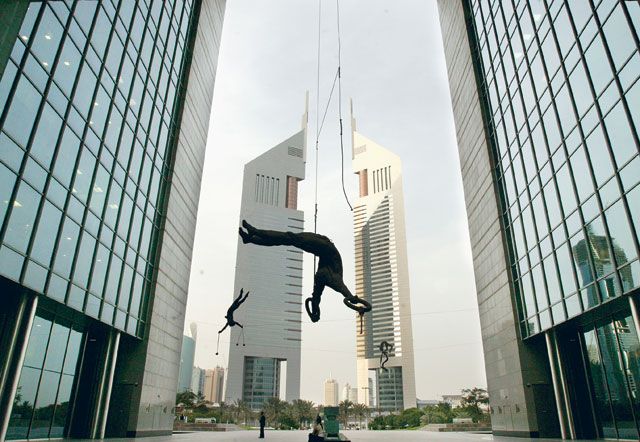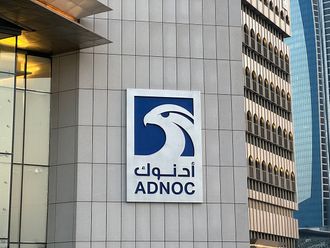Dubai: The DIFC Courts, the independent judicial system within the financial district, constitute a critical element of DIFC's offering to the financial industry.
Created following extensive consultation and review of international best practices, the DIFC Courts give financial services companies the confidence that justice will be dispensed fairly, effectively and speedily in all civil and commercial disputes.
The DIFC Courts have developed a bench of internationally renowned judges well versed in commercial disputes.
The DIFC Courts are probably the most luxurious courts anywhere in the world. The ultra-modern courtrooms boast leather chairs and plasma screens.
They are housed in purpose-built premises approached through sliding glass doors and granite hallways. Fitted with the latest audio and video-conferencing facilities, litigants are even offered welcome drinks and newspapers.
It is not the luxury alone that distinguishes the DIFC courts. "There is probably no precedent in history that a financial jurisdiction has its own exclusive and independent courts to interpret and adjudicate its own laws," says Sir Anthony Evans, Chief Justice of DIFC Courts.
Jurisdiction
The courts, which held their first sitting on October 25, 2005, have administered justice in a number of substantial disputes that came before them. The jurisdiction of the courts is not limited to commercial transactions or regulatory appeals but include all disputes arising out of any contract concluded, or any incident that occurs, in the DIFC.
These include personal injury actions, employment claims, landlord and tenant issues and any number of smaller civil disputes.
The DIFC Courts were established under the laws enacted by the late Shaikh Maktoum Bin Rashid Al Maktoum in December 2004. The laws establishing the DIFC Courts meet the highest international standards of legal procedure, thus ensuring that the DIFC Courts provide the certainty, flexibility and efficiency expected by global institutions operating within the DIFC.
"The provision of this fundamental judiciary authority will be a significant step in the development of the region's legal system. The courts are operating to international standards, thus encouraging further investment into the region from the international business community, which is beneficial to the development of the economy as a whole," said Omar Bin Sulaiman, Governor of DIFC.
The DIFC Courts, mandated exclusively to deal with all the cases and claims arising out of the DIFC and DIFC operations, have three levels — the Court of First Instance, the Court of Appeal and the Final Court of Appeal — and a small claims tribunal.
In late 2004 the Dubai government enacted two new laws creating a judicial authority and establishment of an independent court system for the Dubai International Financial Centre (DIFC).
The law on the Judicial Authority at the DIFC defines the jurisdiction of the court, allowing for the independent administration of justice in the DIFC.The DIFC Court Law sets out the powers, procedures, functions and administration of the court.
The independent court system allows for a matter to be heard either within the DIFC Court or in a court of another jurisdiction if the parties so wish.
The DIFC laws are applicable by default unless the parties choose the laws of another jurisdiction. This flexibility takes into account the different circumstances and requirements of companies and institutions and allows them to ensure a dispute is heard within the legal framework that best suits them.
The laws provide for a court system designed especially for the sophisticated transactions conducted in the DIFC. The DIFC Courts carry out their functions in an independent manner in accordance with the provisions of the DIFC laws and regulations. While the DIFC Courts have jurisdiction only over civil and commercial matters, all criminal cases arising from the jurisdiction will be referred to the Dubai Public Prosecution and Dubai Courts.
"We are not a criminal court and there's no way we can send people to prison, but we would be able to do this through the Dubai Courts. We work closely with the Dubai Courts and other judicial bodies within the UAE. The jurisdiction and functions of DIFC Courts are well defined and the chances of a clash with other jurisdictions are limited," Sir Anthony said.
While the courts are independent of the DIFC Authority and Dubai Financial Services Authority (DFSA), both these bodies fall under the jurisdiction of the DIFC Courts.
The DIFC Courts have the power, in matters over which they have jurisdiction, to make any orders and to issue or direct the issue of any writs it considers appropriate. Orders may be made in relation to restitution, disgorgement, compensation or damages.
First-class alternative dispute resolution
On February 17 last year Shaikh Maktoum Bin Mohammad Bin Rashid Al Maktoum, Deputy Ruler of Dubai, inaugurated the DIFC-LCIA Arbitration Centre, a strategic partnership between the DIFC Authority and the London Court of International Arbitration (LCIA).
The initiative, which was well received by the legal community worldwide, positioned DIFC as a world-class centre for alternative dispute resolution.
Headquartered at the DIFC, the Arbitration Centre is dedicated to the effective resolution of business disputes through arbitration and mediation.
The Arbitration Centre has a unique standing among professionals in the international arbitration and mediation community due to three key factors.
Firstly, arbitrations conducted in the DIFC are governed by the DIFC's Arbitration Law, a state-of-the-art law based on the UNCITRAL Model Law on International Commercial Arbitration.
Secondly, the proceedings are supervised by the DIFC Courts, whose judicial panel includes eminent judges from around the world.
Thirdly, the Arbitration Centre, closely supported by the LCIA, offers all the services offered by the LCIA casework secretariat in London.
The DIFC-LCIA Arbitration Centre's arbitration and mediation rules are a close adaptation of the LCIA Rules. They are universally applicable and compatible with both civil and common-law systems, offering the business community, lawyers and arbitrators a comprehensive and modern set of rules and procedures.
The Arbitration Centre has access to the LCIA's unique database of qualified legal and non-legal arbitrators, enabling it to appoint tribunals of the highest calibre.
In just a year after its inception, the Arbitration Centre has proved to be an unprecedented success with a double-digit case load.
Appointment of Judges
The DIFC Courts' judges appointed under Article 3(4) of the Judicial Authority Law are appointed for a specified period not exceeding three years, and may be re-appointed, provided that such period may not extend beyond the day when the judge turns 75 years old. As per the DIFC Court Law, all judges shall take an oath of office before the Ruler or his delegate before commencing duties.
Removal of Judges
A judge may be removed from office by a decree issued by the Ruler for reasons of inability, incapacity or misbehaviour that is found to have taken place by an independent inquiry established by the Ruler, whose findings have been published.
Remuneration
The judges receive remuneration determined by the Ruler on the recommendation of the Chief Justice. The rate of remuneration of a judge will not be diminished while the judge is in office.
Court proceedings
All proceedings before the courts shall be conducted in English and open to the public unless otherwise conducted by the presiding judge in the interest of justice. The Chief Justice is responsible for managing the administrative affairs of the DIFC Court. The DIFC Court receives funding for this purpose from the Government of Dubai in accordance with Article 8(5) of Dubai Law No 9.
Enforcement of orders
Judgments, orders and awards issued or ratified by the DIFC Court may be enforced within the DIFC in the manner prescribed in the Rules of Court. Judgments, orders and awards issued or ratified by the DIFC Court may be enforced outside the DIFC in accordance with the Judicial Authority Law.
Funding
The Court receives its funding from the Government of Dubai for which it has to submit an estimate of the annual income and expenditure. Such estimates include figures relating to levels of remuneration and entitlement to expenses of judges, registrars, officers, employees and agents of the DIFC Court.












